Impact of Attitude, Job Satisfaction, and Commitment in Organizations
VerifiedAdded on 2020/04/07
|7
|2186
|123
Report
AI Summary
This report provides an in-depth analysis of organizational behavior, focusing on the interplay between employee attitudes, job satisfaction, and organizational commitment. It explores how attitude directly impacts behavior and influences decision-making within an organization. The report highlights the significance of positive attitudes in enhancing work performance and achieving organizational goals. It also examines factors contributing to job satisfaction and organizational commitment, differentiating between affective, continuance, and normative commitment. The report underscores the importance of managerial roles in fostering motivation, enhancing employee confidence, and ultimately improving overall organizational performance. It emphasizes the need for managers to apply motivational theories, appreciate employee efforts, and create a positive work environment to retain employees and achieve objectives effectively. The report references various academic sources to support its findings, providing a comprehensive understanding of organizational dynamics.
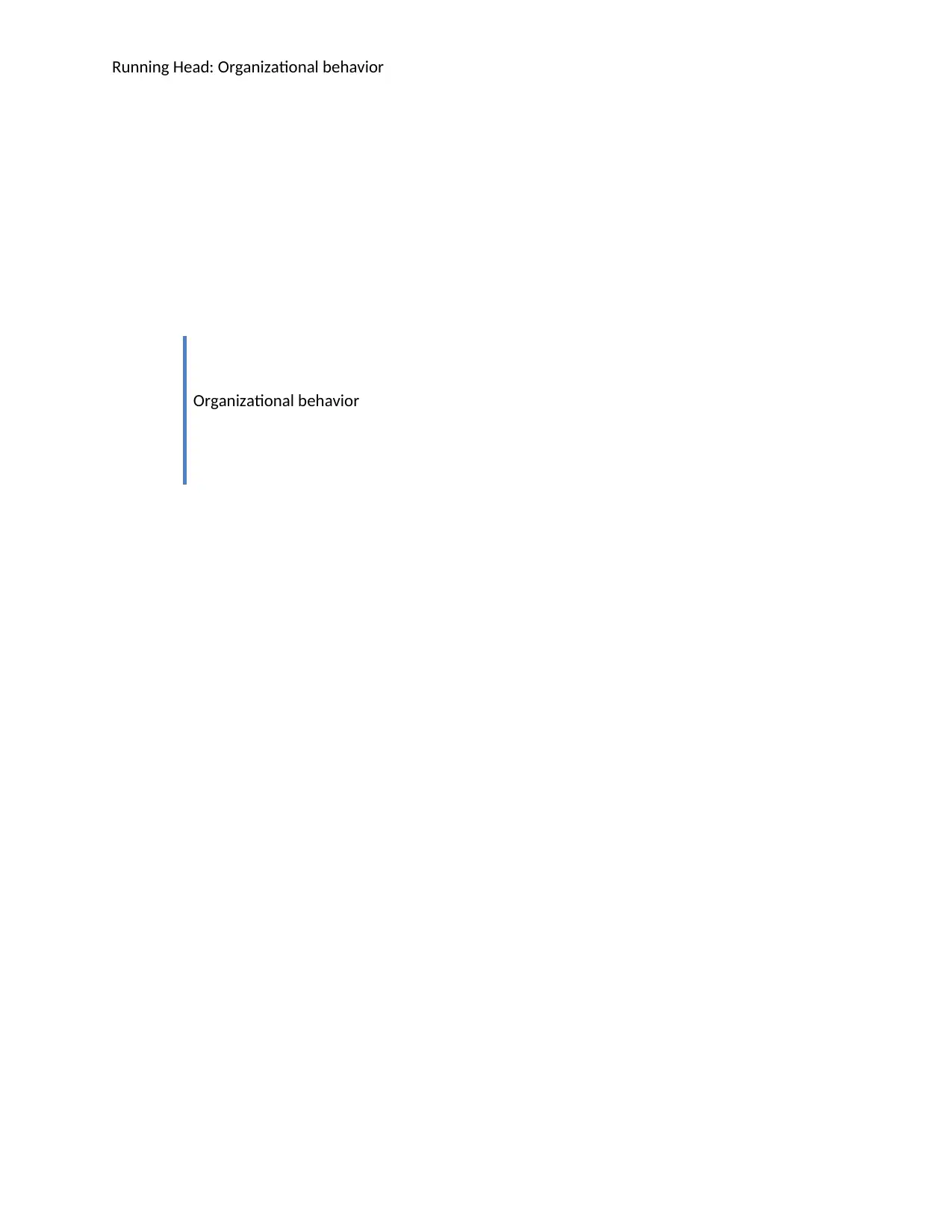
Running Head: Organizational behavior
Organizational behavior
Organizational behavior
Paraphrase This Document
Need a fresh take? Get an instant paraphrase of this document with our AI Paraphraser
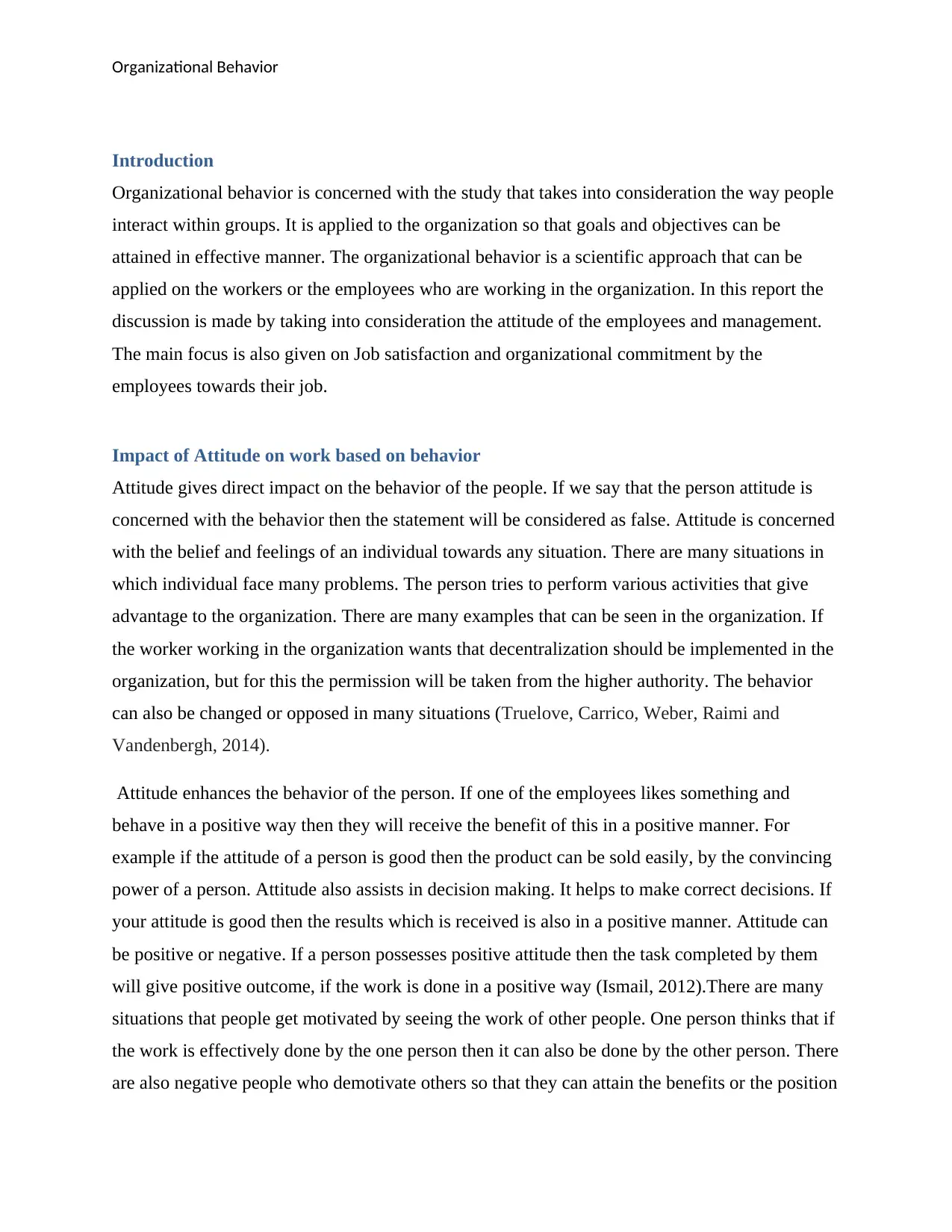
Organizational Behavior
Introduction
Organizational behavior is concerned with the study that takes into consideration the way people
interact within groups. It is applied to the organization so that goals and objectives can be
attained in effective manner. The organizational behavior is a scientific approach that can be
applied on the workers or the employees who are working in the organization. In this report the
discussion is made by taking into consideration the attitude of the employees and management.
The main focus is also given on Job satisfaction and organizational commitment by the
employees towards their job.
Impact of Attitude on work based on behavior
Attitude gives direct impact on the behavior of the people. If we say that the person attitude is
concerned with the behavior then the statement will be considered as false. Attitude is concerned
with the belief and feelings of an individual towards any situation. There are many situations in
which individual face many problems. The person tries to perform various activities that give
advantage to the organization. There are many examples that can be seen in the organization. If
the worker working in the organization wants that decentralization should be implemented in the
organization, but for this the permission will be taken from the higher authority. The behavior
can also be changed or opposed in many situations (Truelove, Carrico, Weber, Raimi and
Vandenbergh, 2014).
Attitude enhances the behavior of the person. If one of the employees likes something and
behave in a positive way then they will receive the benefit of this in a positive manner. For
example if the attitude of a person is good then the product can be sold easily, by the convincing
power of a person. Attitude also assists in decision making. It helps to make correct decisions. If
your attitude is good then the results which is received is also in a positive manner. Attitude can
be positive or negative. If a person possesses positive attitude then the task completed by them
will give positive outcome, if the work is done in a positive way (Ismail, 2012).There are many
situations that people get motivated by seeing the work of other people. One person thinks that if
the work is effectively done by the one person then it can also be done by the other person. There
are also negative people who demotivate others so that they can attain the benefits or the position
Introduction
Organizational behavior is concerned with the study that takes into consideration the way people
interact within groups. It is applied to the organization so that goals and objectives can be
attained in effective manner. The organizational behavior is a scientific approach that can be
applied on the workers or the employees who are working in the organization. In this report the
discussion is made by taking into consideration the attitude of the employees and management.
The main focus is also given on Job satisfaction and organizational commitment by the
employees towards their job.
Impact of Attitude on work based on behavior
Attitude gives direct impact on the behavior of the people. If we say that the person attitude is
concerned with the behavior then the statement will be considered as false. Attitude is concerned
with the belief and feelings of an individual towards any situation. There are many situations in
which individual face many problems. The person tries to perform various activities that give
advantage to the organization. There are many examples that can be seen in the organization. If
the worker working in the organization wants that decentralization should be implemented in the
organization, but for this the permission will be taken from the higher authority. The behavior
can also be changed or opposed in many situations (Truelove, Carrico, Weber, Raimi and
Vandenbergh, 2014).
Attitude enhances the behavior of the person. If one of the employees likes something and
behave in a positive way then they will receive the benefit of this in a positive manner. For
example if the attitude of a person is good then the product can be sold easily, by the convincing
power of a person. Attitude also assists in decision making. It helps to make correct decisions. If
your attitude is good then the results which is received is also in a positive manner. Attitude can
be positive or negative. If a person possesses positive attitude then the task completed by them
will give positive outcome, if the work is done in a positive way (Ismail, 2012).There are many
situations that people get motivated by seeing the work of other people. One person thinks that if
the work is effectively done by the one person then it can also be done by the other person. There
are also negative people who demotivate others so that they can attain the benefits or the position
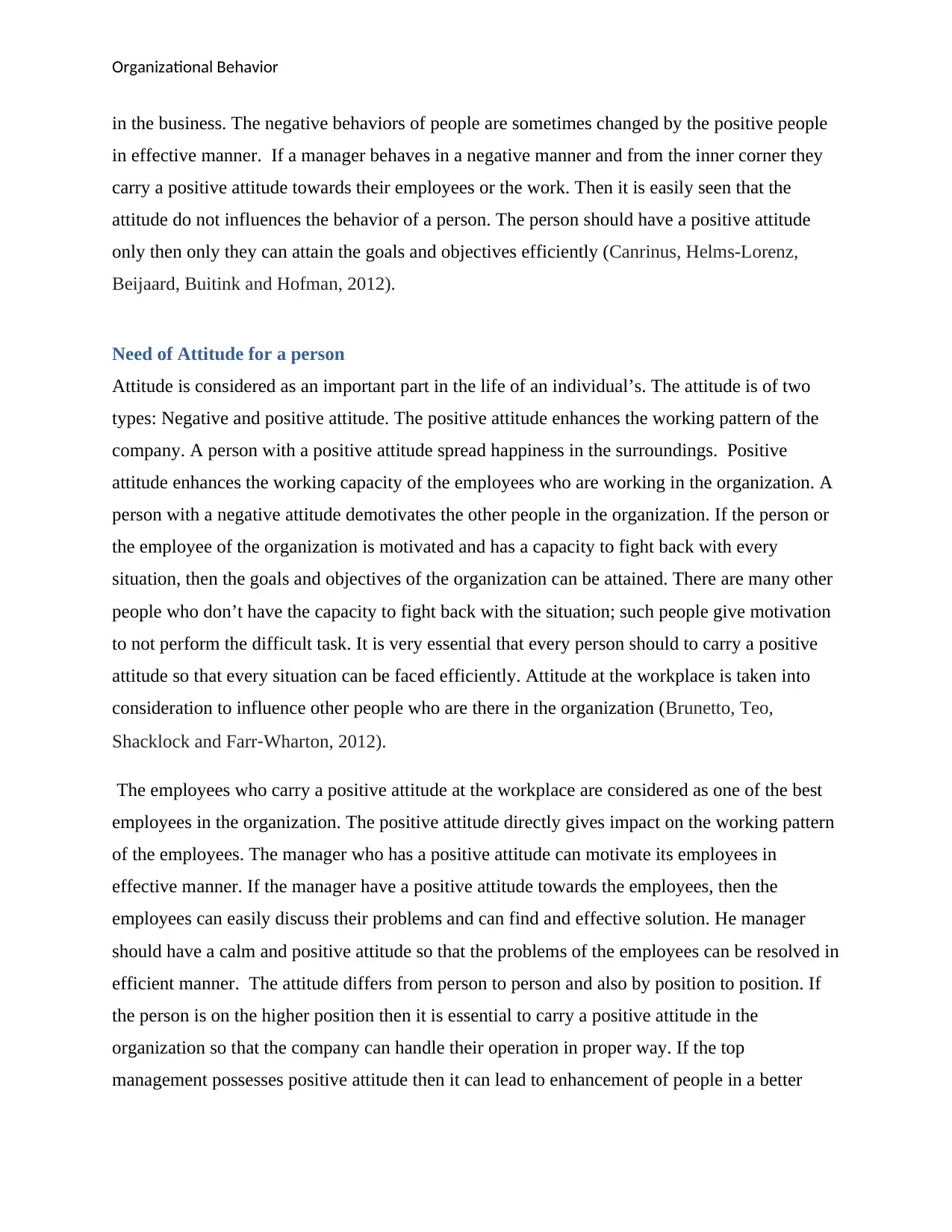
Organizational Behavior
in the business. The negative behaviors of people are sometimes changed by the positive people
in effective manner. If a manager behaves in a negative manner and from the inner corner they
carry a positive attitude towards their employees or the work. Then it is easily seen that the
attitude do not influences the behavior of a person. The person should have a positive attitude
only then only they can attain the goals and objectives efficiently (Canrinus, Helms-Lorenz,
Beijaard, Buitink and Hofman, 2012).
Need of Attitude for a person
Attitude is considered as an important part in the life of an individual’s. The attitude is of two
types: Negative and positive attitude. The positive attitude enhances the working pattern of the
company. A person with a positive attitude spread happiness in the surroundings. Positive
attitude enhances the working capacity of the employees who are working in the organization. A
person with a negative attitude demotivates the other people in the organization. If the person or
the employee of the organization is motivated and has a capacity to fight back with every
situation, then the goals and objectives of the organization can be attained. There are many other
people who don’t have the capacity to fight back with the situation; such people give motivation
to not perform the difficult task. It is very essential that every person should to carry a positive
attitude so that every situation can be faced efficiently. Attitude at the workplace is taken into
consideration to influence other people who are there in the organization (Brunetto, Teo,
Shacklock and Farr‐Wharton, 2012).
The employees who carry a positive attitude at the workplace are considered as one of the best
employees in the organization. The positive attitude directly gives impact on the working pattern
of the employees. The manager who has a positive attitude can motivate its employees in
effective manner. If the manager have a positive attitude towards the employees, then the
employees can easily discuss their problems and can find and effective solution. He manager
should have a calm and positive attitude so that the problems of the employees can be resolved in
efficient manner. The attitude differs from person to person and also by position to position. If
the person is on the higher position then it is essential to carry a positive attitude in the
organization so that the company can handle their operation in proper way. If the top
management possesses positive attitude then it can lead to enhancement of people in a better
in the business. The negative behaviors of people are sometimes changed by the positive people
in effective manner. If a manager behaves in a negative manner and from the inner corner they
carry a positive attitude towards their employees or the work. Then it is easily seen that the
attitude do not influences the behavior of a person. The person should have a positive attitude
only then only they can attain the goals and objectives efficiently (Canrinus, Helms-Lorenz,
Beijaard, Buitink and Hofman, 2012).
Need of Attitude for a person
Attitude is considered as an important part in the life of an individual’s. The attitude is of two
types: Negative and positive attitude. The positive attitude enhances the working pattern of the
company. A person with a positive attitude spread happiness in the surroundings. Positive
attitude enhances the working capacity of the employees who are working in the organization. A
person with a negative attitude demotivates the other people in the organization. If the person or
the employee of the organization is motivated and has a capacity to fight back with every
situation, then the goals and objectives of the organization can be attained. There are many other
people who don’t have the capacity to fight back with the situation; such people give motivation
to not perform the difficult task. It is very essential that every person should to carry a positive
attitude so that every situation can be faced efficiently. Attitude at the workplace is taken into
consideration to influence other people who are there in the organization (Brunetto, Teo,
Shacklock and Farr‐Wharton, 2012).
The employees who carry a positive attitude at the workplace are considered as one of the best
employees in the organization. The positive attitude directly gives impact on the working pattern
of the employees. The manager who has a positive attitude can motivate its employees in
effective manner. If the manager have a positive attitude towards the employees, then the
employees can easily discuss their problems and can find and effective solution. He manager
should have a calm and positive attitude so that the problems of the employees can be resolved in
efficient manner. The attitude differs from person to person and also by position to position. If
the person is on the higher position then it is essential to carry a positive attitude in the
organization so that the company can handle their operation in proper way. If the top
management possesses positive attitude then it can lead to enhancement of people in a better
⊘ This is a preview!⊘
Do you want full access?
Subscribe today to unlock all pages.

Trusted by 1+ million students worldwide
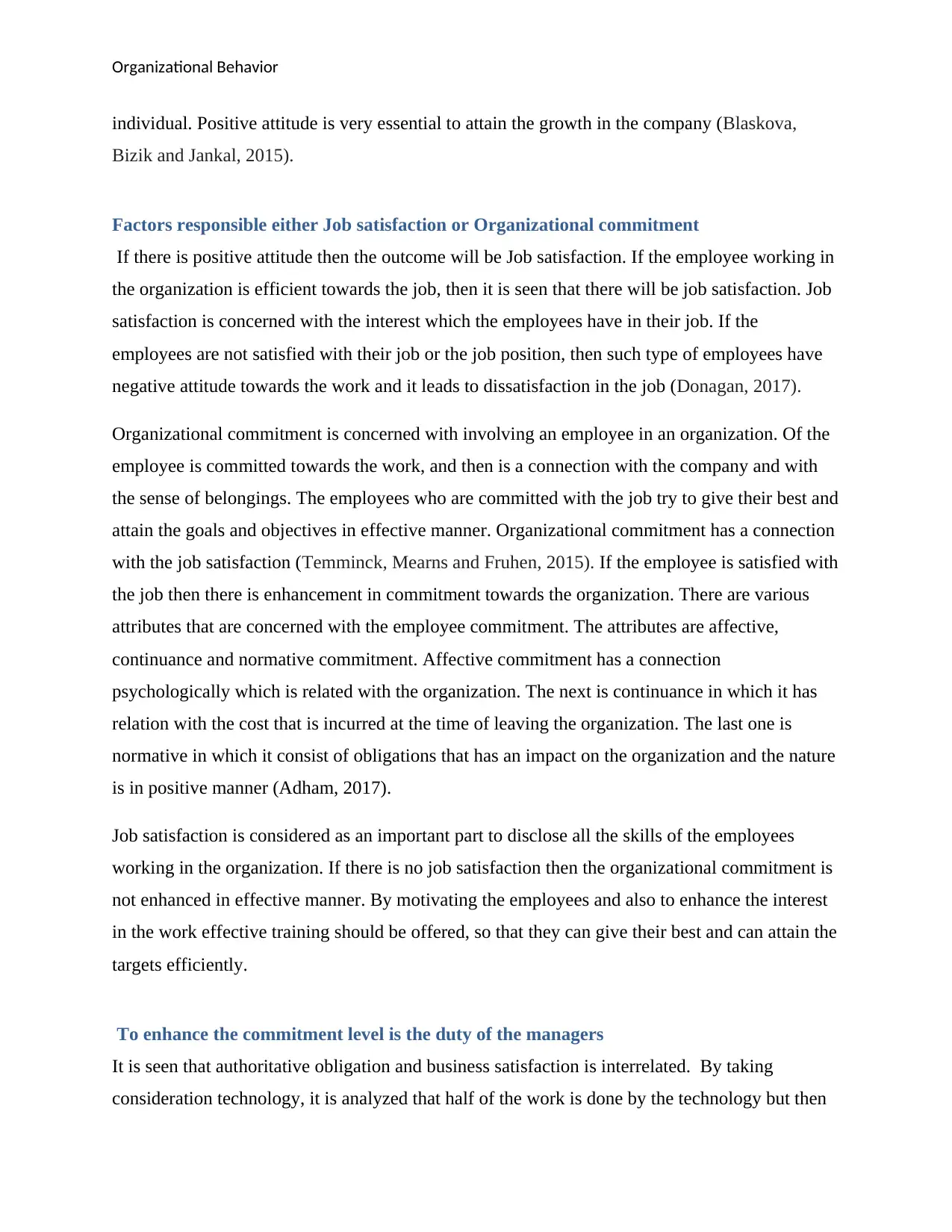
Organizational Behavior
individual. Positive attitude is very essential to attain the growth in the company (Blaskova,
Bizik and Jankal, 2015).
Factors responsible either Job satisfaction or Organizational commitment
If there is positive attitude then the outcome will be Job satisfaction. If the employee working in
the organization is efficient towards the job, then it is seen that there will be job satisfaction. Job
satisfaction is concerned with the interest which the employees have in their job. If the
employees are not satisfied with their job or the job position, then such type of employees have
negative attitude towards the work and it leads to dissatisfaction in the job (Donagan, 2017).
Organizational commitment is concerned with involving an employee in an organization. Of the
employee is committed towards the work, and then is a connection with the company and with
the sense of belongings. The employees who are committed with the job try to give their best and
attain the goals and objectives in effective manner. Organizational commitment has a connection
with the job satisfaction (Temminck, Mearns and Fruhen, 2015). If the employee is satisfied with
the job then there is enhancement in commitment towards the organization. There are various
attributes that are concerned with the employee commitment. The attributes are affective,
continuance and normative commitment. Affective commitment has a connection
psychologically which is related with the organization. The next is continuance in which it has
relation with the cost that is incurred at the time of leaving the organization. The last one is
normative in which it consist of obligations that has an impact on the organization and the nature
is in positive manner (Adham, 2017).
Job satisfaction is considered as an important part to disclose all the skills of the employees
working in the organization. If there is no job satisfaction then the organizational commitment is
not enhanced in effective manner. By motivating the employees and also to enhance the interest
in the work effective training should be offered, so that they can give their best and can attain the
targets efficiently.
To enhance the commitment level is the duty of the managers
It is seen that authoritative obligation and business satisfaction is interrelated. By taking
consideration technology, it is analyzed that half of the work is done by the technology but then
individual. Positive attitude is very essential to attain the growth in the company (Blaskova,
Bizik and Jankal, 2015).
Factors responsible either Job satisfaction or Organizational commitment
If there is positive attitude then the outcome will be Job satisfaction. If the employee working in
the organization is efficient towards the job, then it is seen that there will be job satisfaction. Job
satisfaction is concerned with the interest which the employees have in their job. If the
employees are not satisfied with their job or the job position, then such type of employees have
negative attitude towards the work and it leads to dissatisfaction in the job (Donagan, 2017).
Organizational commitment is concerned with involving an employee in an organization. Of the
employee is committed towards the work, and then is a connection with the company and with
the sense of belongings. The employees who are committed with the job try to give their best and
attain the goals and objectives in effective manner. Organizational commitment has a connection
with the job satisfaction (Temminck, Mearns and Fruhen, 2015). If the employee is satisfied with
the job then there is enhancement in commitment towards the organization. There are various
attributes that are concerned with the employee commitment. The attributes are affective,
continuance and normative commitment. Affective commitment has a connection
psychologically which is related with the organization. The next is continuance in which it has
relation with the cost that is incurred at the time of leaving the organization. The last one is
normative in which it consist of obligations that has an impact on the organization and the nature
is in positive manner (Adham, 2017).
Job satisfaction is considered as an important part to disclose all the skills of the employees
working in the organization. If there is no job satisfaction then the organizational commitment is
not enhanced in effective manner. By motivating the employees and also to enhance the interest
in the work effective training should be offered, so that they can give their best and can attain the
targets efficiently.
To enhance the commitment level is the duty of the managers
It is seen that authoritative obligation and business satisfaction is interrelated. By taking
consideration technology, it is analyzed that half of the work is done by the technology but then
Paraphrase This Document
Need a fresh take? Get an instant paraphrase of this document with our AI Paraphraser
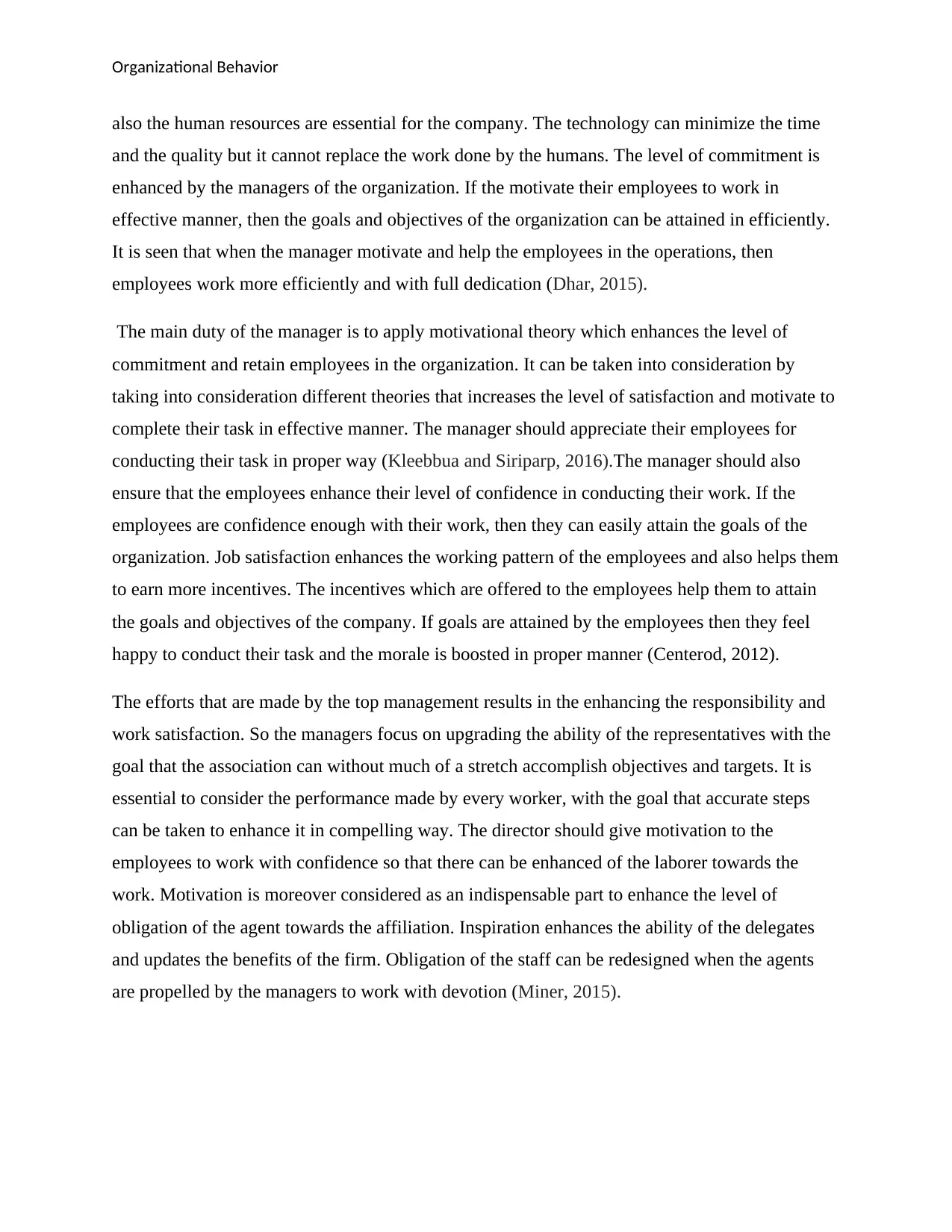
Organizational Behavior
also the human resources are essential for the company. The technology can minimize the time
and the quality but it cannot replace the work done by the humans. The level of commitment is
enhanced by the managers of the organization. If the motivate their employees to work in
effective manner, then the goals and objectives of the organization can be attained in efficiently.
It is seen that when the manager motivate and help the employees in the operations, then
employees work more efficiently and with full dedication (Dhar, 2015).
The main duty of the manager is to apply motivational theory which enhances the level of
commitment and retain employees in the organization. It can be taken into consideration by
taking into consideration different theories that increases the level of satisfaction and motivate to
complete their task in effective manner. The manager should appreciate their employees for
conducting their task in proper way (Kleebbua and Siriparp, 2016).The manager should also
ensure that the employees enhance their level of confidence in conducting their work. If the
employees are confidence enough with their work, then they can easily attain the goals of the
organization. Job satisfaction enhances the working pattern of the employees and also helps them
to earn more incentives. The incentives which are offered to the employees help them to attain
the goals and objectives of the company. If goals are attained by the employees then they feel
happy to conduct their task and the morale is boosted in proper manner (Centerod, 2012).
The efforts that are made by the top management results in the enhancing the responsibility and
work satisfaction. So the managers focus on upgrading the ability of the representatives with the
goal that the association can without much of a stretch accomplish objectives and targets. It is
essential to consider the performance made by every worker, with the goal that accurate steps
can be taken to enhance it in compelling way. The director should give motivation to the
employees to work with confidence so that there can be enhanced of the laborer towards the
work. Motivation is moreover considered as an indispensable part to enhance the level of
obligation of the agent towards the affiliation. Inspiration enhances the ability of the delegates
and updates the benefits of the firm. Obligation of the staff can be redesigned when the agents
are propelled by the managers to work with devotion (Miner, 2015).
also the human resources are essential for the company. The technology can minimize the time
and the quality but it cannot replace the work done by the humans. The level of commitment is
enhanced by the managers of the organization. If the motivate their employees to work in
effective manner, then the goals and objectives of the organization can be attained in efficiently.
It is seen that when the manager motivate and help the employees in the operations, then
employees work more efficiently and with full dedication (Dhar, 2015).
The main duty of the manager is to apply motivational theory which enhances the level of
commitment and retain employees in the organization. It can be taken into consideration by
taking into consideration different theories that increases the level of satisfaction and motivate to
complete their task in effective manner. The manager should appreciate their employees for
conducting their task in proper way (Kleebbua and Siriparp, 2016).The manager should also
ensure that the employees enhance their level of confidence in conducting their work. If the
employees are confidence enough with their work, then they can easily attain the goals of the
organization. Job satisfaction enhances the working pattern of the employees and also helps them
to earn more incentives. The incentives which are offered to the employees help them to attain
the goals and objectives of the company. If goals are attained by the employees then they feel
happy to conduct their task and the morale is boosted in proper manner (Centerod, 2012).
The efforts that are made by the top management results in the enhancing the responsibility and
work satisfaction. So the managers focus on upgrading the ability of the representatives with the
goal that the association can without much of a stretch accomplish objectives and targets. It is
essential to consider the performance made by every worker, with the goal that accurate steps
can be taken to enhance it in compelling way. The director should give motivation to the
employees to work with confidence so that there can be enhanced of the laborer towards the
work. Motivation is moreover considered as an indispensable part to enhance the level of
obligation of the agent towards the affiliation. Inspiration enhances the ability of the delegates
and updates the benefits of the firm. Obligation of the staff can be redesigned when the agents
are propelled by the managers to work with devotion (Miner, 2015).
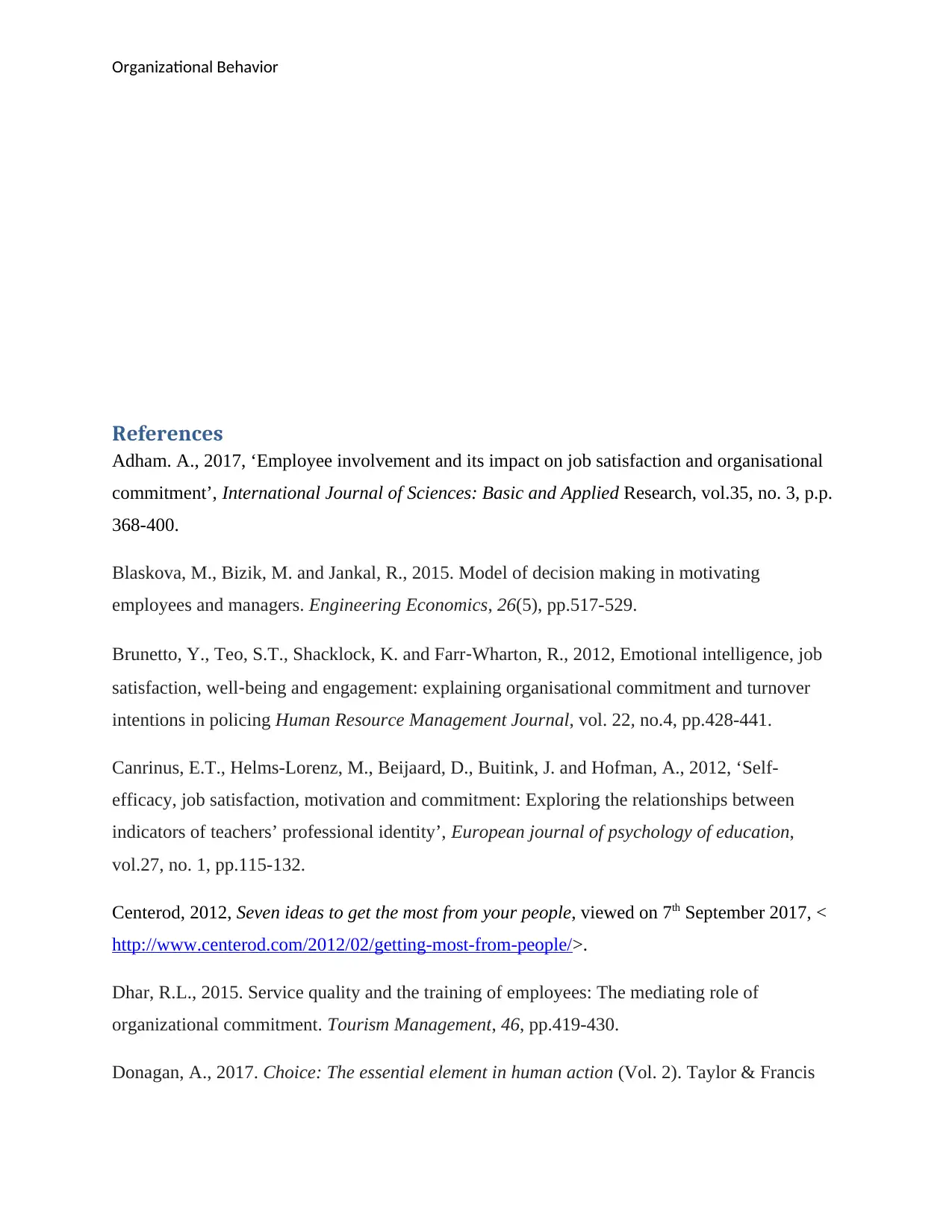
Organizational Behavior
References
Adham. A., 2017, ‘Employee involvement and its impact on job satisfaction and organisational
commitment’, International Journal of Sciences: Basic and Applied Research, vol.35, no. 3, p.p.
368-400.
Blaskova, M., Bizik, M. and Jankal, R., 2015. Model of decision making in motivating
employees and managers. Engineering Economics, 26(5), pp.517-529.
Brunetto, Y., Teo, S.T., Shacklock, K. and Farr‐Wharton, R., 2012, Emotional intelligence, job
satisfaction, well‐being and engagement: explaining organisational commitment and turnover
intentions in policing Human Resource Management Journal, vol. 22, no.4, pp.428-441.
Canrinus, E.T., Helms-Lorenz, M., Beijaard, D., Buitink, J. and Hofman, A., 2012, ‘Self-
efficacy, job satisfaction, motivation and commitment: Exploring the relationships between
indicators of teachers’ professional identity’, European journal of psychology of education,
vol.27, no. 1, pp.115-132.
Centerod, 2012, Seven ideas to get the most from your people, viewed on 7th September 2017, <
http://www.centerod.com/2012/02/getting-most-from-people/>.
Dhar, R.L., 2015. Service quality and the training of employees: The mediating role of
organizational commitment. Tourism Management, 46, pp.419-430.
Donagan, A., 2017. Choice: The essential element in human action (Vol. 2). Taylor & Francis
References
Adham. A., 2017, ‘Employee involvement and its impact on job satisfaction and organisational
commitment’, International Journal of Sciences: Basic and Applied Research, vol.35, no. 3, p.p.
368-400.
Blaskova, M., Bizik, M. and Jankal, R., 2015. Model of decision making in motivating
employees and managers. Engineering Economics, 26(5), pp.517-529.
Brunetto, Y., Teo, S.T., Shacklock, K. and Farr‐Wharton, R., 2012, Emotional intelligence, job
satisfaction, well‐being and engagement: explaining organisational commitment and turnover
intentions in policing Human Resource Management Journal, vol. 22, no.4, pp.428-441.
Canrinus, E.T., Helms-Lorenz, M., Beijaard, D., Buitink, J. and Hofman, A., 2012, ‘Self-
efficacy, job satisfaction, motivation and commitment: Exploring the relationships between
indicators of teachers’ professional identity’, European journal of psychology of education,
vol.27, no. 1, pp.115-132.
Centerod, 2012, Seven ideas to get the most from your people, viewed on 7th September 2017, <
http://www.centerod.com/2012/02/getting-most-from-people/>.
Dhar, R.L., 2015. Service quality and the training of employees: The mediating role of
organizational commitment. Tourism Management, 46, pp.419-430.
Donagan, A., 2017. Choice: The essential element in human action (Vol. 2). Taylor & Francis
⊘ This is a preview!⊘
Do you want full access?
Subscribe today to unlock all pages.

Trusted by 1+ million students worldwide
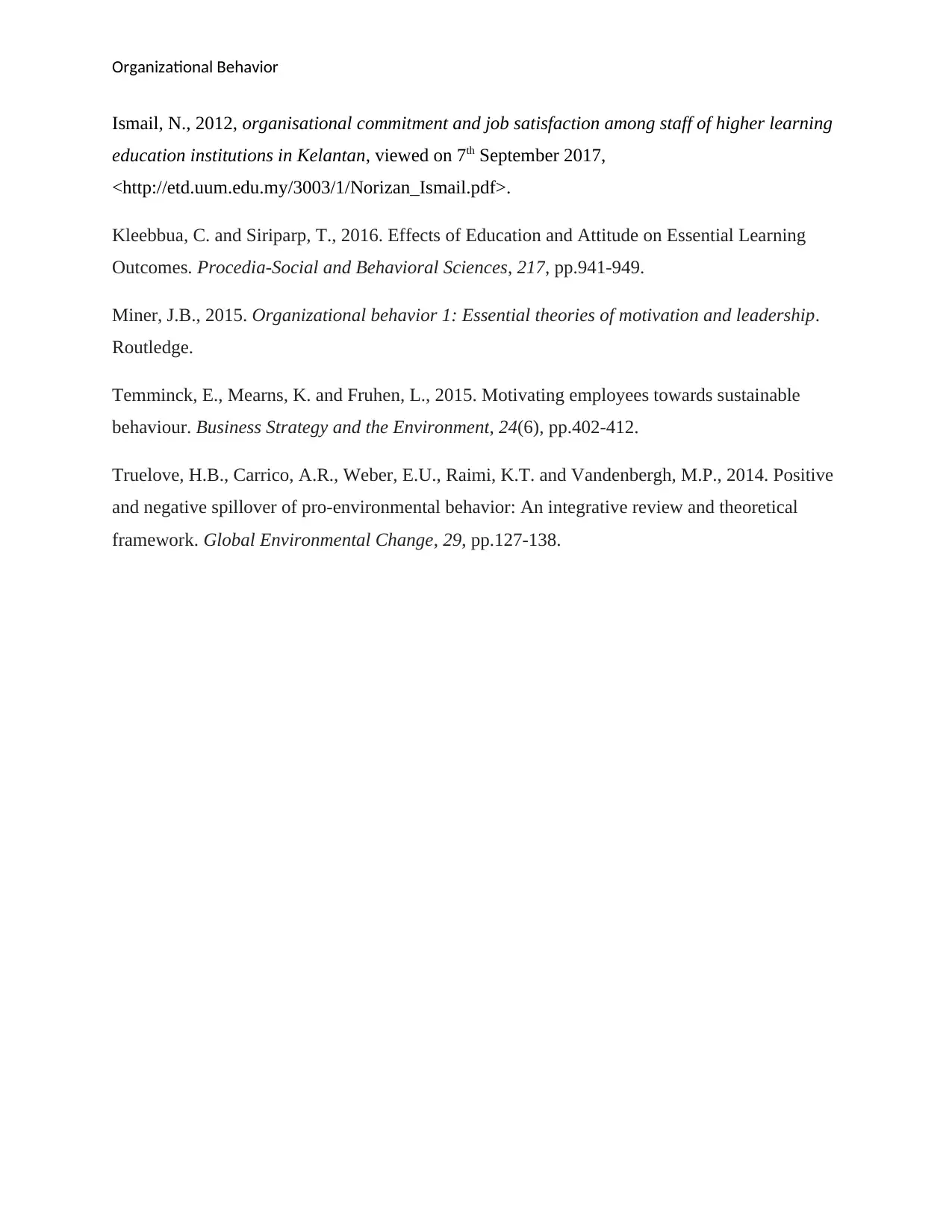
Organizational Behavior
Ismail, N., 2012, organisational commitment and job satisfaction among staff of higher learning
education institutions in Kelantan, viewed on 7th September 2017,
<http://etd.uum.edu.my/3003/1/Norizan_Ismail.pdf>.
Kleebbua, C. and Siriparp, T., 2016. Effects of Education and Attitude on Essential Learning
Outcomes. Procedia-Social and Behavioral Sciences, 217, pp.941-949.
Miner, J.B., 2015. Organizational behavior 1: Essential theories of motivation and leadership.
Routledge.
Temminck, E., Mearns, K. and Fruhen, L., 2015. Motivating employees towards sustainable
behaviour. Business Strategy and the Environment, 24(6), pp.402-412.
Truelove, H.B., Carrico, A.R., Weber, E.U., Raimi, K.T. and Vandenbergh, M.P., 2014. Positive
and negative spillover of pro-environmental behavior: An integrative review and theoretical
framework. Global Environmental Change, 29, pp.127-138.
Ismail, N., 2012, organisational commitment and job satisfaction among staff of higher learning
education institutions in Kelantan, viewed on 7th September 2017,
<http://etd.uum.edu.my/3003/1/Norizan_Ismail.pdf>.
Kleebbua, C. and Siriparp, T., 2016. Effects of Education and Attitude on Essential Learning
Outcomes. Procedia-Social and Behavioral Sciences, 217, pp.941-949.
Miner, J.B., 2015. Organizational behavior 1: Essential theories of motivation and leadership.
Routledge.
Temminck, E., Mearns, K. and Fruhen, L., 2015. Motivating employees towards sustainable
behaviour. Business Strategy and the Environment, 24(6), pp.402-412.
Truelove, H.B., Carrico, A.R., Weber, E.U., Raimi, K.T. and Vandenbergh, M.P., 2014. Positive
and negative spillover of pro-environmental behavior: An integrative review and theoretical
framework. Global Environmental Change, 29, pp.127-138.
1 out of 7
Related Documents
Your All-in-One AI-Powered Toolkit for Academic Success.
+13062052269
info@desklib.com
Available 24*7 on WhatsApp / Email
![[object Object]](/_next/static/media/star-bottom.7253800d.svg)
Unlock your academic potential
Copyright © 2020–2026 A2Z Services. All Rights Reserved. Developed and managed by ZUCOL.





